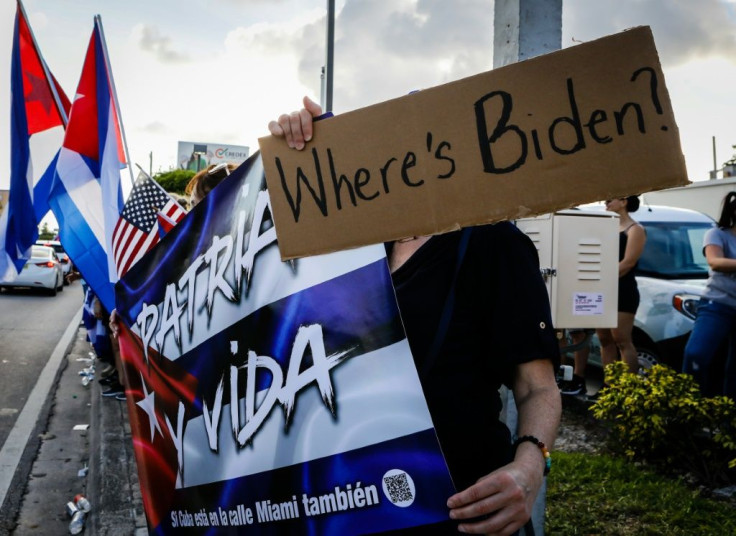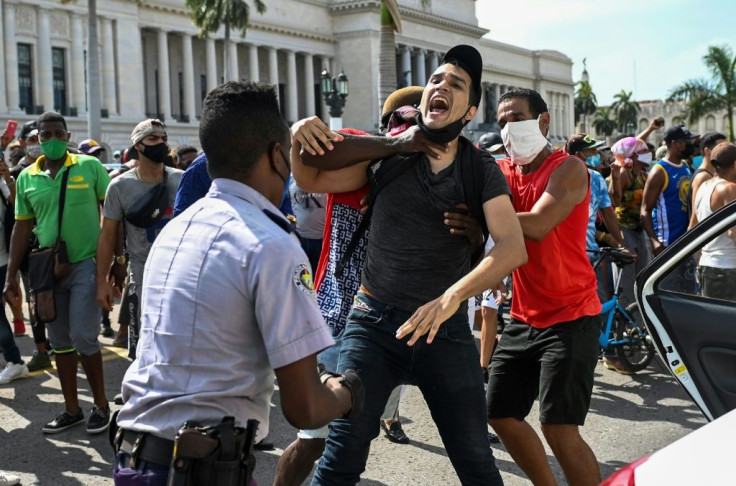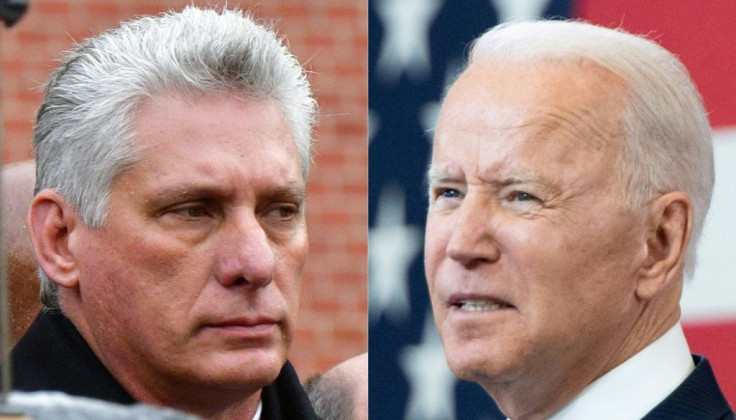Cubans 'Disappointed' With Lack Of Biden Action
Thousands of Cubans protesting against their government managed to catch the attention of US President Joe Biden, but they have been left deflated by his response.
Most Cubans -- even those that had never heard of him -- welcomed Biden's presidency after four years of worsening relations and increasing sanctions under his predecessor Donald Trump.
Prior to his election, Biden had told online opposition news outlet Cibercuba that he would eliminate Trump's restrictions on remittances and travel, which he said had harmed Cubans and separated families.
But six months into his tenure, Cubans are still waiting for concrete action to back up the promises.
"Obviously, he's disappointed many (Cubans) who hoped, not that he would return to the (Barack) Obama policies, but that he would reverse Trump's crudest measures," Cuban academic and former diplomat Carlos Alzugaray told AFP.

"There's no doubt there was a lot of expectation over many things" that Biden said during his election campaign.
On July 11 and 12, thousands of Cubans took to the streets in 40 cities around the island shouting "Freedom," "Down with the dictatorship," and "We're hungry."
One person died, dozens were injured and more than 100 were detained.
Biden took note, but did not announce new measures. He did, however, trade barbs with Cuban President Miguel Diaz-Canel.
"Cuba is, unfortunately, a failed state and repressing their citizens," Biden said on Thursday.
The next day, Diaz-Canel fired back: "The United States has failed in its efforts to destroy Cuba, despite spending billions of dollars to do so.

"If President Joseph Biden had sincere humanitarian concern for the Cuban people, he could eliminate the 243 measures implemented by President Donald Trump, including the more than 50 cruelly imposed during the (coronavirus) pandemic, as a first step towards ending the blockade" in force since 1962, he said.
The protests erupted amid sharp economic deterioriation and a spike in Covid-19 infections, despite Cuba being the only Latin American country to have developed its own vaccines.
While insisting he is in no rush to allow Cuban-Americans to send remittances to the island nation of 11 million people -- for fear of the government "confiscating" them -- Biden has offered to help out with its immunization drive instead.

"I'd be prepared to give significant amounts of vaccine if, in fact, I was assured an international organization would administer those vaccines and do it in a way that average citizens would have access to those vaccines," he said on Thursday.
The exiled opposition -- banned in the one-party communist state -- has called for a strong response to Havana.
Diaz-Canel has accused the United States of organizing and funding the protests and called on die-hard communists to take to the streets themselves to defend the revolution that brought Fidel Castro to power in the 1950s.
Russia, China and left-wing governments in Latin America have expressed support for the Cuban regime.
Not only ordinary Cubans have expressed disappointment at Biden's lack of action.
"You don't see any changes, the blockade measures are still in place," lamented Cuba's Foreign Minister Bruno Rodriguez earlier this week.
"The protests have put Cuba on Washington's agenda once again. But at the same time, they have made it difficult, if not impossible, for the Biden administration to lift the punitive measures" introduced by Trump, Michael Shifter, president of the Washington-based Inter-American Dialogue think tank, told AFP.
"The policy that toughened notably under Trump remains on autopilot for the moment."
If Biden wants to "soften and bend" this policy to something with a "more humanitarian focus, it will be harshly criticized by Republicans, for giving in too much to the regime."
However, Ben Rhodes, the former US national security advisor under president Obama, urged Biden to act.
"Cubans have been bravely expressing their frustrations and exercising their universal rights in ways that are truly inspiring. We should be thinking above all about what we can do to help them," Rhodes tweeted on Tuesday.
He advocated for a restoration of remittances and travel, and the return of US embassy personnel to Havana.
New York-based anti-embargo lobbying group Cuban Americans For Engagement (CAFE) hit out at the Biden administration for being "hypocritical when it claims to support the Cuban people while complacently applauding the demonstrations."
"We urge that common sense prevails on both shores, that sanctions be lifted and that democratization mechanisms be put into motion," the group said.
"We do not have 60 years more to spend" waiting for life to improve for ordinary Cubans, it added.
© Copyright AFP {{Year}}. All rights reserved.




















